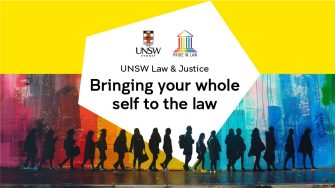Are we free to be real, professionally?
Insights from a panel discussion on authenticity and inclusion in law.
Insights from a panel discussion on authenticity and inclusion in law.

UNSW Law & Justice, in partnership with Pride in Law, recently hosted a free panel discussion titled ‘Bringing Your Whole Self to the Law,’ exploring authenticity and inclusivity in the legal profession.
“We were delighted to gather on campus to celebrate diversity and inclusion within our profession. Not only did we have fantastic speakers, but this event also offered a great opportunity to connect students with mentors and really foster a more supportive network,” says UNSW Law & Justice Dean Professor Andrew Lynch.
The catered event included networking before and after the panel discussion, thoughtfully moderated by UNSW Law Society Queer Officer Conna Leslie-Keefe and NSW Pride in Law President Jessica Lehman.
The panelists were Nicole Evans from Barker Evans, Gillian Mahony SC with 8 Wentworth Chambers, and Chris Pearce, Senior Lecturer in Law. Their engaging discussion delved into aspects of managing professional ambition in a predominantly straight world.
Just some of the topics explored include coming out at a law firm, advice for queer aspiring lawyers, and how to be an effective ally to the queer community.
Gillian, Nicole, and Chris had very different experiences in their first law jobs. While Gillian’s strong community connections had smoothed her career change from theatre production, Nicole and Chris faced challenges. They had started working in law when still at university, and while Chris was in a close relationship then, Nicole didn’t know any gay people—let alone gay lawyers.
“It was a longer journey for me to feel comfortable,” she says. Nicole needed to embrace who she was before trusting her workplace could, too. She was eventually outed at work, and the reaction was not as positive as it could have been.
Chris had veiled his identity at work until a request for personal leave triggered his boss’ dogged determination to know exactly why he should allow time off.
“He kept pushing to the point I kind of snapped,” says Chris. “I said, ‘My boyfriend's in hospital. I need to go.’ He said, ‘Take as much time as you need.’ And that was the end of the conversation.”
Although Nicole and Chris experienced challenges, they learned how much better the workplace is when you can be yourself.
“It was so freeing that I wish I’d done it sooner,” says Nicole. She saw a real and positive change in people when her authoritative Lesbians & The Law: A Guidebook for Australian Families was published.
Chris realised his ‘serious lawyer’ act had been exhausting. He focused his newfound energy at work on giving his best, even using his identity during job interviews to help identify suitable future workplaces. He was recently named 2024 Academic of the Year.
Gillian, now a barrister at one of Australia’s premier chambers, acknowledges her workplace experience benefited from having a supportive community.
“I think there's a real absence of that (community) now for young people,” she says. “It's important to find allies and supporters, whether they're allies in the true sense of the word or just someone that you gel with.”
Gillian illustrates the power of allyship by sharing something that happened to a cherished colleague: A barrister, who had been openly insulted by his courtroom peers, had a husband excluded from his work’s social events for years. When his colleagues’ wives realised, they flatly refused to join events until his husband was invited.
Set the standard with inclusive language
Educate yourself on queer perspectives
Call out intolerance when you see it
“We need allies, and we need that support, because it is powerful,” says Gillian. Nicole and Chris agree that normalising inclusive behaviours and language is how allies can make queer people comfortable. They recommend proactively seeking awareness of the challenges that LGBTQIA+ people face and being brave enough to speak up.
Pride in Law is a national organisation that promotes inclusion in the legal profession. This event exemplifies its commitment to creating a more inclusive environment for all legal professionals by fostering open dialogue.
Likewise, UNSW is committed to ensuring LGBTQIA+ students and staff can thrive without experiencing alienation or ill-treatment at university. Our LGBTQIA+ Community includes resources and training from the ally@UNSW Network.